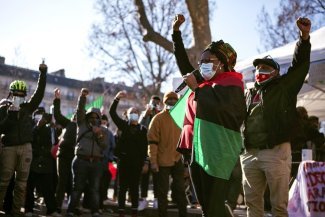Meltem, Nehir and Emre are parents, teachers, students but above all members of the citizens’ group for secular education, Hepimiz İçin Laik Eğitim.
When they heard, shortly before the summer, of the government’s plans to reform school textbooks, their surprise was as great as the changes foreseen.
“We knew the government was planning to change the curricula,” explains Meltem Figen, a mother, “but usually we can at least see the PDF version on the internet before they are printed. It didn’t happen like that this time.”
One of the reforms that has most angered the government’s opponents is the decision to stop teaching Darwin’s theory of evolution in school. At the moment it only applies to some levels of primary and secondary school but it will be extended in the 2018-2019 school year to all classes.
Nehir Sevim, who is studying for a degree in environmental studies, is amongst those resisting the change. That is why he joined the citizens’ group. “Not teaching evolution anymore, interfering in science teaching...over time these reforms will affect all of society. Children’s education is the future of our country. It is important that everyone has access to a scientific and general education,” he insists.
The Deputy Prime Minister Numan Kurtulmus announced last September that Darwin’s work was “outdated and wrong”.
Dilek (a pseudonym) is beginning her fifth year as a biology teacher in secondary school. This young woman believes the “decision make no sense. We cannot say the name ‘Darwin’, but we must continue teaching about cell development”.
Dilek became a union member in her first year of teaching. As a committed unionist, she decided to follow the advice of her union, Eğitim-Sen: to continue talking about Charles Darwin in class. “His name will not appear in any documents, but I must talk about him in my classes.”
“A pious youth”
“We have set aside some controversial topics because we know that it is impossible for our students to have the scientific knowledge or the elements necessary to comprehend them,” argued Alparslan Durmuş, chair of the Education Council last June in a 26-minute video to present the new school programmes.
The reform covers a total of 51 subjects, including another controversial one: “the true meaning of jihad”. The concept is now taught from primary level in the ‘imam hatip’, the religious schools initially supposed to train imams, but now open to all.
“Jihad is an element of our religion: it is part of it, so it is the duty of the Ministry of Education to teach this concept in an appropriate way,” said Turkish Minister of Education Ismet Yılmaz. An extra hour is now devoted, furthermore, to lessons on religion, at all levels and in all schools.
The reforms as a whole are proving so divisive because they crystallise a division in society that marks the history of modern Turkey: secularism versus religion. It’s a battle that has been fought since the creation of the secular Republic of Turkey in 1923 by Mustafa Kemal Atatürk, but which has today became more and more politicised, to the detriment of the secular camp.
These reforms are in line with the wishes of President Erdoğan and his government: to move away from an overly “Europecentric” vision in order to train “the pious youth”. It is the Turkish President’s dream.
Back in 2014 he said “if you ask young people who Albert Einstein is, everyone has something to say. But, if you ask them who Ibni Sina [known as Avicenna, Persian scholar 980-1037, Ed] is, most of them will not know.”
This is by no means the first reform of Turkey’s school system. In its 15 years of power, the AKP, the Justice and Development Party, has changed the system over ten times. Why, then, are these latest reforms proving so controversial?
The opposition sees this as yet another attempt by the government to impose a standardised vision of Turkish society and its history. “They want to Islamise the youth,” says Feray Aytekin Aydoğan, the president of the teachers’ union Eğitim-Sen. “Since 2012, little girls are allowed to wear the veil at school from age nine and prayer rooms have been built even though many schools have no libraries or gyms.”
The unions also point to the multiplication of the number of ‘imam hatip’ schools to substantiate their view. According to an article published by the daily newspaper Birgün, over 1,000 ‘imam hatip’ schools, both secondary schools and colleges, were opened in 2016 alone. Today nearly ten per cent of school pupils on the country attend these establishments.
According to figures published by the daily newspaper Hürriyet, 40,000 pupils have been enrolled in these schools this year, not necessarily by choice. Meral Gülşen and Dilara (a pseudonym) work in a primary school and a college respectively. At a meeting in a café in central Istanbul with other colleagues, they discuss ways of avoiding ending up in “one way” education.
“The government wants to present a Muslim, specifically Sunni, and conservative society,” says Meral. Dilara adds, after making sure that her true identity is not revealed: “I teach social sciences. There is a new module on ‘Democracy and Citizenship’ that is completely centred around the attempted coup of 15 July 2016. We, as teachers, have to introduce 10-year-olds to the story of the people who were thrown under tanks like heroes. We talk about war, about violence. But I would like to teach them peace.”
Organising the resistance
Three months have passed since the start of the school year. The demonstrations have not made the government back down, and the citizens’ groups are changing tack.
“We organise brainstorming meetings around the content of education, parents of students are playing a bigger role in schools, then they meet up in their neighbourhoods to report back,” says Sevim.
Emre, the father of a teenager who will be entering high school next year, has decided to tackle science issues at home.
“We explained to him that he had to study what he was taught at school, because there are exams. But he is not obliged to believe everything. We help him develop his knowledge and critical thinking as much as possible.”
This hands-on father concedes nevertheless that many parents decide to send their children to private - and expensive - institutions in the hope of giving them a “better education”.
Emre takes part in meetings, keeps himself informed and passes the information on to other parents. “I am not only fighting for my own child but for all the children of our country”.
Indeed, citizen initiatives are emerging, notably that of a group of scientists from the Middle East Technical University in Ankara, Evrim Ağacı (the tree of evolution, in English). They have just launched the project
‘Müfredat Biziz’ (‘The school programme is us’) and publish videos on the internet to reach the highest possible audience.
“We offer videos on evolution, on modern science and all kinds of topics that we have expertise in as scientists to highlight the gaps in education and help our citizens to educate themselves,” explains Çağrı Mert Bakırcı, the group’s founder.
A new challenge has already surfaced: a few days after the start of the school year, the government decided to cancel the high school entrance exam.
Like in many other countries, future high school students will now be assigned to the school closest to home. The threat of the ‘imam hatip’ looms. Pro-secular parents are ready to take a stand.
Amongst the most radical solutions envisaged, some families are already thinking of moving to get closer to the establishment of their choice.









